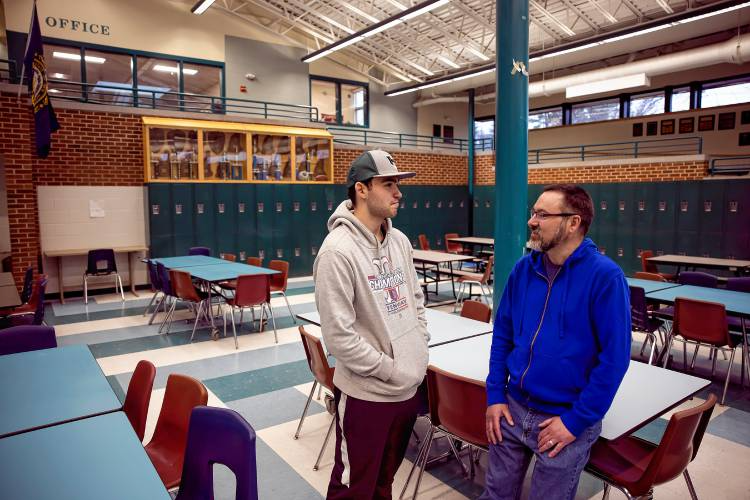UNH students, administration discuss ‘sick days’ during the pandemic
October 27, 2021
Fall of 2021 is the fourth consecutive college semester that’s been impacted by COVID-19. In February, University of New Hampshire (UNH) President Dean noted that the university was seeing consequences of “Covid fatigue.” Fast forward eight months, and one can only extrapolate how this phenomenon has worsened. Furthermore, due to loosened mask-wearing restrictions and the world “opening back up,” cold and flu season is affecting colleges once more.
In the early stages of the pandemic, many people believed “sick day culture” in the United States would change for the better. Inclusivity and understanding would be practiced, and if people weren’t feeling well, they’d be able and willing to take a day off.
“I really believed something positive to come from the pandemic would be a change in the toxic work culture of still going into work when you’re sick, but the amount of people I see every day atm on public transport coughing and sniffing, has proven me wrong,” a tweet from this past Monday reads.
However, now over 18 months into the pandemic, people are still working while sick. The availability of working remotely means even if one stays home, they’re often expected to still be working.
Presenteeism refers to the loss of productivity or efficiency that we experience when we are not fully-functioning selves at school or work. A 2019 article from CNBC states that 90% of employees have worked while being sick. Their reasons for working in spite of a cold, flu or something else include feeling pressure and having too much work.
An article from Michigan State University’s college newspaper explains why college students go to class even when they’ve caught their “campus plague,” a catch-all term used to describe the many sicknesses that run rampant on campuses throughout the fall and winter: strep throat, influenza, the common cold and others. One doctor notes that it’s particularly hard in general for college students to stay healthy due to a number of factors including population density, stress, lack of sleep or efficient hygiene.
Students interviewed in The State News’ article said they still attended class while being sick because they worried about falling behind, getting bad grades, or their professors were not accommodating.
This semester, UNH students have experienced similar struggles.
“Professors are not being accommodating at all. Not allowing students to have access to zoom or recordings unless it’s a documented absence. Then even if [documented], the absence messes up grading. I know we all don’t necessarily like to use zoom or recorded lectures but there is a HUGE benefit to them. Professors are trying to go back to the way things were before the pandemic and frankly it’s just not possible,” said junior College of Liberal Arts student Lydia Collyns on Facebook.
“I had it counted against me as an absence because I commute and couldn’t make it for a few days. It definitely impacted my grade and now I’m recovering and extremely stressed trying to play catch up,” said sophomore Paul College student Farryn Leppanen on Facebook.
Some students have had more positive experiences.
“I have a professor for a master’s course that has a zoom room set up for a student who works full-time, and she lets anyone who isn’t feeling well use it. I also have a different professor who excuses us from discussions in class if we miss the class because we’re sick—doesn’t matter what type of sick; she doesn’t question it. There’s no penalty for being sick as long as you’re being truthful,” said graduate student Morgan Parrish on Facebook.
At UNH, there is no university-wide policy on course attendance, said Senior Vice Provost of Academic Affairs Kate Ziemer.
“All faculty who receive letters from the Dean of Students for any excused absence are expected to work with students to help them keep up with course materials,” she said in an email. She also noted that faculty are expected to outline attendance requirements for the class in their syllabi.
If a student must miss class due to quarantine or isolation, professors and lecturers are not required to offer a Zoom option.
When a student must miss class due to COVID-19 related issues or “documented and compelling non-academic circumstances that are beyond their control,” Dean of Students Mike Blackman is notified by the contact tracing team and/or Health & Wellness, and automatically sends notice to the students’ teachers explaining that the student cannot attend class and “ask that the faculty offer the student consideration while the student can’t be there.”
“The expectation is that faculty work with the student to come up with a plan for the student to stay on top of the work. It’s not required (or always possible) that the faculty offer a Zoom option, but many faculty choose to do that,” Blackman said in an email with The New Hampshire.
If a student feels they have been unfairly treated or penalized by a professor when they miss class due to being sick or having COVID-19, Blackman said “students can reach out to me directly and I can work with them and/or the faculty to help sort it out. I can also involve the college dean’s office if needed.”
Experts worry that this year’s double-whammy of COVID-19 and flu season could be even worse than average, creating a potential “twindemic.” For UNH students, it will be imperative to follow health and safety guidance such as mask-wearing when appropriate, COVID-19 and influenza vaccinations, regular handwashing and sanitation and others.




























Anonymous • Oct 29, 2021 at 6:53 pm
5